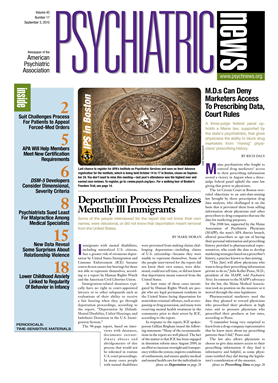In 2013 the American Board of Psychiatry and Neurology (ABPN) will require clinicians to complete what is being called a Performance-in-Practice (PIP) clinical module. It essentially consists of a chart review of five or more patients with comparison of the clinician's performance against recommended standards of care and will serve as part 4 of the ABPN's process for maintenance of certification.
The use of a PIP module as well as the movement toward maintenance of certification more generally (as opposed to one-time certification and periodic recertification) is part of a radical transformation of the way physicians will be required to demonstrate competence and maintain board certification and even possibly maintain a license to practice medicine.
In a 2006 interview with Psychiatric News, ABPN President Larry Faulkner, M.D., said the PIP clinical module will meet a requirement by the American Board of Medical Specialties (ABMS) that physicians build into their routine practice the capacity to assess their performance continually against guidelines for best practices and make improvements to meet those guidelines.
“It boils down to a quality-improvement process,” he said. “In general, physicians are going to have to demonstrate that they have looked at their practices and identified issues that need to be improved.”
The PIP requirement is still being developed by the ABMS and the ABPN. But in preparation for 2013, APA's Division of Education has published two sample PIP modules, on major depressive disorder and PTSD, in Focus: The Journal of Lifelong Learning in Psychiatry.
Two additional sample modules are in the works for 2011 on substance abuse screening and psychiatric evaluation and management.
Members who complete each module receive five hours of CME credit. “These are online, but the doctor prints out the forms and reviews their charts on paper, noting that the performance measures have been documented in their own patient charts,” said Deborah Hales, M.D., director of APA's Division of Education, in an interview. “This is a voluntary activity, and we hope that by getting feedback, APA can develop more streamlined electronic PIP modules when the ABPN requirements go into effect.
“ABMS and ABPN consider PIP a way to improve the individual doctor's practice quality, doing on an individual level what has been required for hospital and institutions in the past,” Hales said. “The key will be to create meaningful evidence-based measures and an easy to use e-system that will also educate about the rationale and importance of the measures.”

